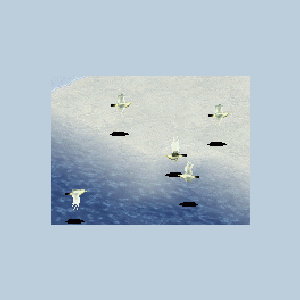About This File
The sea eagles-whose alternate name of erne is rarely used-are not closely related to golden eagles; their nearest relatives are probably certain types of vultures. Their bills are longer and heavier than those of the golden eagles, and (in adults) are bright yellow rather than grey, and their lower legs are unfeathered. They inhabit coastal regions and the vicinity of lakes and streams, and feed mainly but not exclusively on fish. The bald eagle, the national bird of the United States, is a member of this group. It ranges widely in North America from Alaska to Florida, with the largest individuals coming from the northern parts of the range. After the breeding season the northern birds migrate southward, whereas many Florida eagles wander northward. The name "bald", often thought to be a misnomer, does not imply a lack of feathers, but is derived from an obsolete word meaning marked with white, as in piebald. Young birds of this species lack the white head and tail of the adults, which take four to five years to attain. Compared to other eagles, the bald eagle is a relatively clumsy hunter and fisher, and for its prey relies mainly on dead or injured fish, or those that enter shallow water to spawn. It also steals fish from the osprey when the smaller bird has captured a live fish, harassing it in the air until the osprey drops the prey, whereupon the eagle snatches it.
The Eurasian counterpart of the bald eagle is the white-tailed sea eagle, which occasionally strays to Alaska. It is greyer than the bald eagle, and its head is pale but not white. The largest member of this group is Steller's sea eagle, which inhabits coastal areas of north-eastern Asia and occasionally visits the Aleutian and Pribilof islands of Alaska. It is a blackish eagle with a wedge-shaped white tail and (in adults) a large patch of white on the shoulders.
Updated 2010-11-21
Just to save space with less in zip and smaller image.
Nothing new.



Recommended Comments
There are no comments to display.
Create an account or sign in to comment
You need to be a member in order to leave a comment
Create an account
Sign up for a new account in our community. It's easy!
Register a new accountSign in
Already have an account? Sign in here.
Sign In Now